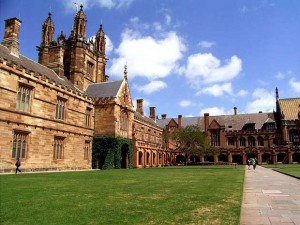 THUNDER BAY – Editorial – My friend and PhD Thesis advisor Peter George was awarded the David C. Smith Award for Significant Contribution to Scholarship and Policy on Higher Education in Canada at a dinner on October 13th hosted by the Council of Ontario Universities. As part of the celebration, Peter George delivered a speech that drew upon his three-term experience as President of McMaster to reflect and comment on the state and future of university education. He noted that during the recent provincial election in Ontario, he did not see a vision for higher education articulated by any of the parties and yet he believes that this is what is needed the most.
THUNDER BAY – Editorial – My friend and PhD Thesis advisor Peter George was awarded the David C. Smith Award for Significant Contribution to Scholarship and Policy on Higher Education in Canada at a dinner on October 13th hosted by the Council of Ontario Universities. As part of the celebration, Peter George delivered a speech that drew upon his three-term experience as President of McMaster to reflect and comment on the state and future of university education. He noted that during the recent provincial election in Ontario, he did not see a vision for higher education articulated by any of the parties and yet he believes that this is what is needed the most.
As he said: “This lack of a real strategic vision for higher education in Ontario is the BIGGEST elephant in this room for it is the one we are ALL riding.” While acknowledging the importance of increased participation and enrollment, among the things he would like to see in a vision for post secondary education include more emphasis on quality and less on accessibility and enrollment levels, more differentiation across universities, and the integration of research and educational priorities so that research spills over into the educational mission.
It is hard not to agree with these components of a vision for Ontario and indeed Canadian post-secondary education but I would like to add a few more points. If we are to have a new vision for post-secondary education, I think it is important that the vision also focus on what post-secondary education is about. I think universities have lost their way over the last few decades and the undergraduate experience diluted but not necessarily because university professors are too focused on their research or because universities are severely underfunded.
Universities should be about advanced research and teaching. They are places where our young – the future of our civilization – should come to learn and learn how to think and how to advance knowledge. Research and teaching are integrally linked – you cannot have good teaching without the depth of knowledge that research activity affords. Without research on the part of academics, teaching ultimately becomes recitation rather than active learning and knowledge generation.
As for the underfunding claim, per capita resources in the post-secondary sector have actually been rising over the last decade and at an impressive clip but the government contribution to basic operations has lagged. Much of the real resource growth has occurred because of increases in research funding as well as tuition increases. However, this resource increase has not been directed into improving the undergraduate experience because universities have lost their focus as places of advanced research and learning designed to build knowledge and learning. Indeed, students are actually paying for this lost focus via higher tuition that is going to fund a wide range of alternate priorities.
In their bid to attract limited government funding and curry favor with a public focused on the immediate, universities have allowed their core mission of research and teaching to become blurred. Universities are now expected to be businesses and generate revenue by fostering commercialization. Universities are expected to prepare students for the jobs of the present and the future by providing relevant skills and job training with knowledge deepening provided by liberal arts and science as an afterthought rather than a core component. Universities are expected to look current by embracing all the latest classroom technologies often at considerable expense without any real evidence as to their efficacy.
Universities are expected to promote accessibility by boosting enrollment. Universities are then also expected to increase student success by offering remedial help and augmented student assistance and support. Universities are expected to be regional economic drivers by strengthening their relationships with their regional communities and embracing their role as contributors to economic development. Universities are expected to promote, support and recognize research that addresses major community concerns as well as drive the frontiers of knowledge.
Universities are also expected to champion every leading cause that comes along and formally integrate it into the curriculum whether it be social justice, wealth inequality, an aging population, global warming, locally grown food, financial literacy or the hazards of reality television as well as develop clear policies to address any issues of oppression on campus. It is no longer enough to rely on the research interests of autonomous faculty and their research programs to do this – it must be planned, directed and coordinated with an ever expanding administrative apparatus. The best of intentions may be behind these moves to expand the undergraduate experience and many of them are indeed noble but there are simply far too many targets for universities to address and not enough instruments
University is supposed to be a broadening experience for students by exposing them to different ideas and views and new knowledge. However, universities today seem to be afflicted with a massive case of attention deficit disorder as they try to be many things to many people. In the end, they risk not doing any of them particularly well and in the process damaging their core function of research and teaching on which the future transmission of our civilization rests. Is this to be our vision for universities in the 21st century?
Perhaps it is time for corrective lenses that allow for some focus.
Livio Di Matteo
 Livio Di Matteo is an economist in Thunder Bay, Ontario specializing in public policy, health economics, public finance and economic history. Livio Di Matteo is a graduate of the Fort William Collegiate Institute (1898-2005) whose school motto “Agimus Meliora” has served as a personal inspiration. Livio Di Matteo holds a PhD from McMaster University, an MA from the University of Western Ontario and an Honours BA from Lakehead University. He is Professor of Economics at Lakehead University where he has served since 1990. His research has explored the sustainability of provincial government health spending, historical wealth and asset holding and economic performance and institutions in Northwestern Ontario and the central North American economic region. His historical wealth research using census-linked probate records is funded by grants from the Social Sciences and Humanities Research Council of Canada. He has constructed, assembled and analyzed nearly 12,000 estate files for Ontario over the period 1870 to 1930. Livio Di Matteo writes and comments on public policy and his articles have appeared in the National Post, Toronto Star, the Winnipeg Free Press and Thunder Bay Chronicle-Journal and NetNewsledger.com. Livio Di Matteo has had an entry in Canadian Who’s Who since 1995.
Livio Di Matteo is an economist in Thunder Bay, Ontario specializing in public policy, health economics, public finance and economic history. Livio Di Matteo is a graduate of the Fort William Collegiate Institute (1898-2005) whose school motto “Agimus Meliora” has served as a personal inspiration. Livio Di Matteo holds a PhD from McMaster University, an MA from the University of Western Ontario and an Honours BA from Lakehead University. He is Professor of Economics at Lakehead University where he has served since 1990. His research has explored the sustainability of provincial government health spending, historical wealth and asset holding and economic performance and institutions in Northwestern Ontario and the central North American economic region. His historical wealth research using census-linked probate records is funded by grants from the Social Sciences and Humanities Research Council of Canada. He has constructed, assembled and analyzed nearly 12,000 estate files for Ontario over the period 1870 to 1930. Livio Di Matteo writes and comments on public policy and his articles have appeared in the National Post, Toronto Star, the Winnipeg Free Press and Thunder Bay Chronicle-Journal and NetNewsledger.com. Livio Di Matteo has had an entry in Canadian Who’s Who since 1995.
This article was originally posted on Livio Di Matteo’s NORTHERN ECONOMIST Blog at http://ldimatte.shawwebspace.ca.
